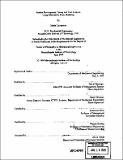Product development timing and cost analysis using information flow modeling
Author(s)
Carrascosa, Maria, 1968-
DownloadFull printable version (5.972Mb)
Advisor
Steven Eppinger and Daniel Whitney.
Terms of use
Metadata
Show full item recordAbstract
In product development processes. coupled tasks are mutually dependent for information. and there is not a clear sequence in which these tasks should be performed. In this thesis we set to answer the following questions (I) what is the proper ordering in which the tasks should be started and (2) what is the appropriate degree of overlap or concurrency between coupled tasks. A mathematical model has been developed based on characterizing the information exchanged between tasks using the probability of change and impact. The probability of change captures the likelihood of the information changing over the course of performing a task and the impact represents the rework generated by a change in the task receiving the information. The model ( I ) estimates the probability of the process being completed as a function of time and (2) provides the average completion time and cost of the development effort for a given degree of concurrency and task sequencing. These results then provide the basis for determining the appropriate task sequence and degree of concurrency to minimize development time and cost. The model was tested in product development settings at Hewlett-Packard and at General Motors. In addition to the case studies, the model has been used to define a set of general rules for sequencing tasks over a wide range of product development situations.
Description
Thesis (S.M.)--Massachusetts Institute of Technology, Dept. of Mechanical Engineering, 1999. Includes bibliographical references (p. 105-107).
Date issued
1999Department
Massachusetts Institute of Technology. Department of Mechanical EngineeringPublisher
Massachusetts Institute of Technology
Keywords
Mechanical Engineering